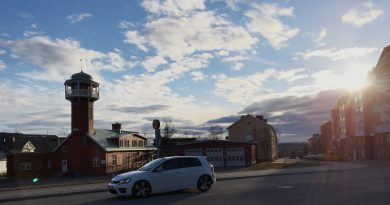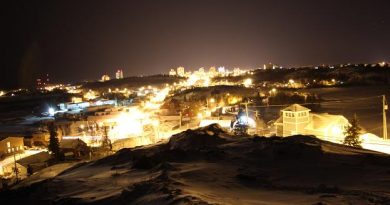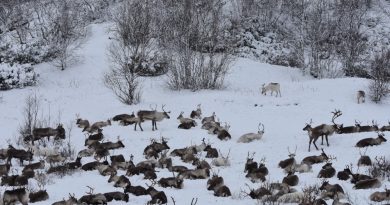Blog: Moving North – Arctic Frontiers in a changing world
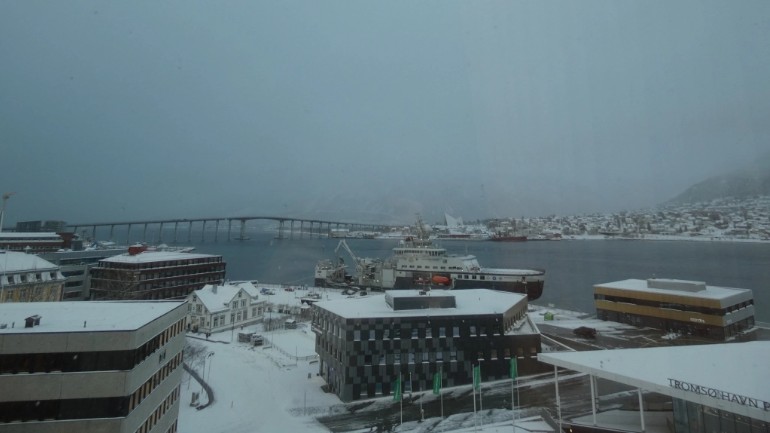
Tromso is living up to its image as Norway’s Arctic capital, as I step off the plane into a flurry of snowflakes and a landscape of white. I first came up here to to the Arctic Frontiers gathering in 2007 to research and make contacts for a series of documentaries to mark the International Polar Year and stimulate public interest in the polar regions.
The world – and the Arctic in particular – have changed dramatically in the 16 years in between, and the pace of that change is accelerating. The shadow of the Russian invasion of Ukraine looms large over this year’s meeting and there is widespread concern that this is diverting attention and resources from tackling the climate warming that is already having life-changing impacts on this region and the rest of the globe.
The Arctic is now known to be warming around four times as fast as the rest of the planet.
Sea ice conditions have dramatically altered. Coastal erosion and permafrost thaw are forcing whole communities to move. Animal and plant species are shifting. Climate change has moved from being a marginal topic to an overriding issue. The Arctic plays a key role and what happens here has huge implications for the climate in distant parts of the globe.
The corona pandemic demonstrated to us all the inter-connectedness of our world, the lurking dangers that can unexpectedly bring our societies to a standstill and shift the foundations of so much we take for granted. It especially showed us the risks of intruding ever further into nature’s territory.
Ukraine and the Arctic
Now, the Russian invasion of Ukraine has made the world a far less safe place, reviving the Cold War fear of a nuclear conflict and unleashing an energy crisis that is threatening our lifestyles and well-being. Russia accounts for some 53 percent of the Arctic coastline and around half the region’s population. The alliance to support Ukraine includes the Scandinavian countries with territory up here – and of course Canada and the USA. The work of the Arctic Council has been disrupted, cooperation with Russia is on hold. An organisation which has worked for so long on being a guarantee of peaceful cooperation and low military tension in this sensitive and fragile environment has been forced to regroup and work without a key member that currently holds the chair of the organisation.
The Arctic region plays a key role in the energy and the climate crises. Traditionally, the focus was on fossil fuels, rich oil and gas resources. On my first visit here to Arctic Frontiers back in 2007, I remember how an intervention from an audience member suggesting there was a paradox between oil drilling and halting global warming caused quite a stir, in a country whose wealth was based on fossil fuels. Now these topics are high on the agenda here and worldwide. The energy transition is underway, but not yet keeping pace with the speed of climate change.
For the indigenous peoples who live up here, the energy transition brings its own challenges. The presence of the rare earth metals we need for our energy transition, for wind turbines, electric car batteries and so on, have brought conflict between traditional land use and the interest in mining new resources. Disputes over reindeer pastures are just one example. Sustainable development is more of a challenge than ever against a background of environmental degradation, a warming climate and a lack of equity in our societies.

“North on the Move”
In a first “big picture” session here, “North on the Move”, the foreign ministers of Norway, Sweden, Iceland, high-ranking figures from Finland and the USA and the President of the Sami parliament summed up the current situation. The overriding message was clear. Russia’s invasion of Ukraine was condemned in no uncertain terms – and has impacted Arctic governance and cooperation across the board. Urgently required scientific data is not being made available. Contacts between indigenous peoples in Russia and the other Arctic regions can no longer function as they did before. The Arctic Frontiers Executive Directer Anu Fredrickson used the metaphor of divorce. Russia has isolated itself from her European neighbours, and attempts to keep military tension out of the Arctic have been thwarted.
The term “Arctic Frontiers” brings differences, separation, disagreement, even conflict to mind first in the current situation. But it is also being demonstrated here that there is so much that unites the peoples of the Arctic, this unique part of the planet: the landscape, the cold, the environment, remote communities, the lifestyle that goes with all of that – , species which take no account of human-made frontiers or borders, – that even this major dispute between Russia and her northern neighbours cannot halt cooperation and the striving for peaceful coexistence, as the people of the high north work to adapt to a changing climate and tackle the challenges facing the Arctic and the rest of the globe.
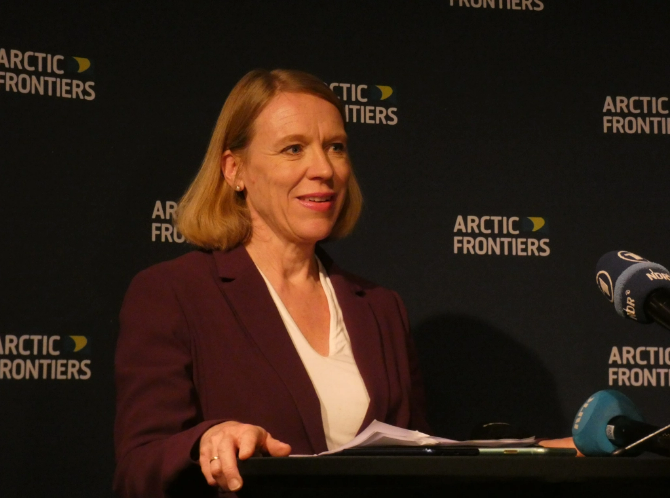
Emerging leaders take longer-term view
At a town-hall discussion last night on “Governing Arctic Risks in Turbulent Times”, a representative of the Arctic Frontiers Emerging leaders programme said this group of 33 young professionals was concerned about many issues. Climate change and biodiversity loss in the Arctic were top of the list. But while research on how to reduce emissions was crucial, it fails to solve the environmental and social problems already being caused by climate change, they said. They would like to see a more holistic approach, cross-sectoral cooperation on adapting to change. The “elephant or bear in the room”, the Russian invasion of Ukraine, could delay the green transition, the young professionals fear. It has also halted promising contacts between researchers, innovators, students, educators in Russia and the West. Finding ways to ensure people-to-people connections and cross-border links are maintained have to be priorities, say the Emerging Leaders. And we must always bear in mind that this war will come to an end – and we have to find ways of living and trading with Russian people afterwards, they say.
The meeting goes on this week here – sadly without so many of the Russian scientists, experts and young people who would have been here under other circumstances. Arctic Frontiers, as the Foreign Minister Anniken Huitfeld stressed, is more important than ever to bring people together to move things forward in this time of multiple crises.
Related stories from around the North:
Arctic: Blog: 2023, yet another “last chance” for the climate?, The Ice Blog
Finland: Finland closes Murmansk consulate office, The Independent Barents Observer
Russia: Lonely Lavrov invites Arctic colleagues to Siberia, but no one will come, The Independent Barents Observer

